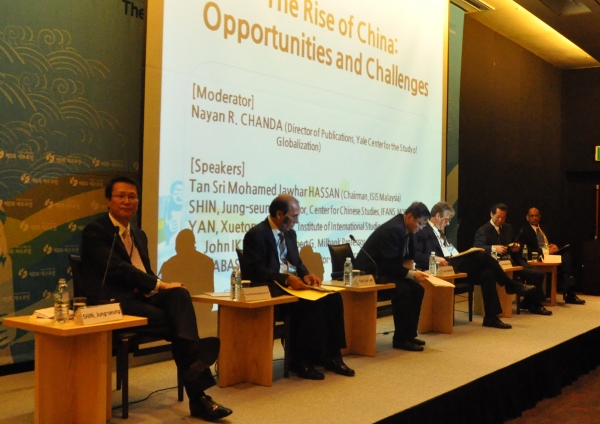- Dispatch 6 from the 6th Jeju Forum for Peace & Prosperity, May 27-29
[May 29, 2 p.m. ]
The Jeju Weekly currently has reporters at the forum venue covering a wide range of talks, sessions and panels. We will be posting brief reports on our Web site throughout the weekend, and then compile them into a comprehensive report for Issue 51 of The Weekly as well as in our Chinese edition. -- Ed.
On May 28, the second day of The Jeju Forum for Peace & Prosperity, an often mentioned topic during many of the conferences was addressed head on during the session “The Rise of China: Opportunities and Challenges.”
Moderated by Yale Center for the Study of Globalization Director of Publications Nayan R. Chandar and discussed by experts from countries directly affect by this issue (China, United States, Japan, Korea, and Malaysia), the five-member panel attempted to contextualize this issue while at the same time address what this change in economic power might mean.
Tan Sri Mohamed Jawhar Hassan, chairman of the Institute of Strategic and International Studies Malaysia, said that the term ‘the rise of China’ is “a little bit misleading,” because what is occurring is a “resurgence” of a former world power, and that it is not only China, but all of Asia that is experiencing this resurgence.
“Very often we like to put this in binary terms; the rise of one power and the fall of another … I don’t think that is happening, far from it,” Hassan said. “All of [the countries] are rising, the difference is some are rising faster than the others.”
Within the next 50 years, China is predicted to become the world’s economic power, and if this comes to fruition, “the US will not be far behind,” Hassan believes.
But this is only in quantitative terms, he continued, but from a qualitative standpoint “the US will be by far number one,” based on the countries expenditure and, due to the difference in population, a higher average per capita GDP.
As the countries are rising together, they are becoming more interconnected, and if all nations continue to work together “these forces will tend to neutralize any hostility,” said Hassan.
The major obstacle he foresees are territorial disputes in connection with China, which generally result in war, he concluded.
Yoichi Funabashi, former editor-in-chief of The Asahi Shimbun said that his country, Japan, has profited greatly economically from the rise of China, which revitalized traditional industries as well as construction and steel industries. He predicts that all of Asia will continue to benefit from China.
Though, Funabashi sees “serious challenges” on the horizon.
“I think the direction and nature of that rise of China is extremely uncertain. For instance what kind of capitalism China’s economy has been evolving? It is very much difficult to define and it is sometimes conceptually, intellectually and politically very much a challenge to all of us,” he said.
Funabashi continued that another uncertain problem exists in how China views its own rise and its place in the world, which could be a security issue. He posed the question: Is China going “to try to make their future compatible with the international order or are they going to explore a very different set of goals?”
Xuetong Yan, director of the Center for Chinese Studies and referred to by Nayan as the “possible future president of China,” said that he thinks China will be able to reach America’s economic stance in the world, “but it will take a very long time for them to catch up with the US in terms of a comprehensive nation power,” meaning in military and political influence.
Yan pointed to the fact that America currently has 36 major security alliances, while China only has one relationship of the same standard, which is with Pakistan and there has been no official treaty. The only formal treaty they have, he continued, is with North Korea, but it has “no substance.”
Another topic that has been discussed in connection to China and its rise, has been its relationship with North Korea, more specifically the recent visit of Kim Jong Il, to which Yan remarked, that North Korea is not a big concern of China’s and Kim’s visit was little more than one of hundreds of heads of state to visit China.
It is “something important, but not that important to China,” he said.
American John G. Ikenberry, Albert G. Milbank professor of Princeton University raised the question, “What is the impact on the political order, on the political formation?”
He continued that there is the argument that since now China has gained power it may try to change the political order to one that mirrors its own.
“Is this a story … of rising states rise up and use their power to usher in a world order that is of their creation?”
Ikenberry does not necessarily think so due to China’s interconnectedness with other nations, pointing out that 40 percent of the country’s income comes from trade. He does pose another question that due to the shift in world power “will the world become less American, will it become less liberal?”
Again he is “skeptical” due to the interconnectedness that China, whether wanting to or not, does not have the ability to “break apart this liberal international system,” and that other countries would not prescribe to this new order.
“Whether it wants to or not China is going to find that it lives in a world that it will have more authority and leadership, and that’s the good news. The bad news is … it won’t be able to make a new system,” he said.
The Korean counterpart of the discussion, Shin Jung Seung, director of the Center for Chinese Studies at the Korea Institute of Foreign Affairs and National Security, diplomatically said, “Most of the Korea people still believe that the rise of China will be more of an opportunity rather than a threat, because it will provide us with real economic and cultural opportunities.”
He did mention the stance China has taken concerning North Korea and some of China’s military actions, but states that ultimately it has been more cooperative than combative.
“I hope they will continue to respect their neighbors with open mindedness and tolerance while they grow stronger,” said Shin, while the international community has a responsibility to give them authority while at the same time keeping them in check.
“As long as China continues to walk the path of peaceful development, I am confident that Korea will look to China for peace and for respect,” said Shin.
Darryl Coote darrylcoote@jejuweekly.com








